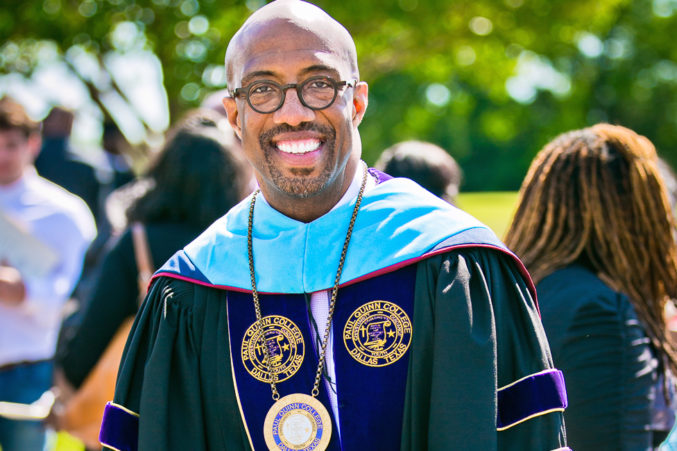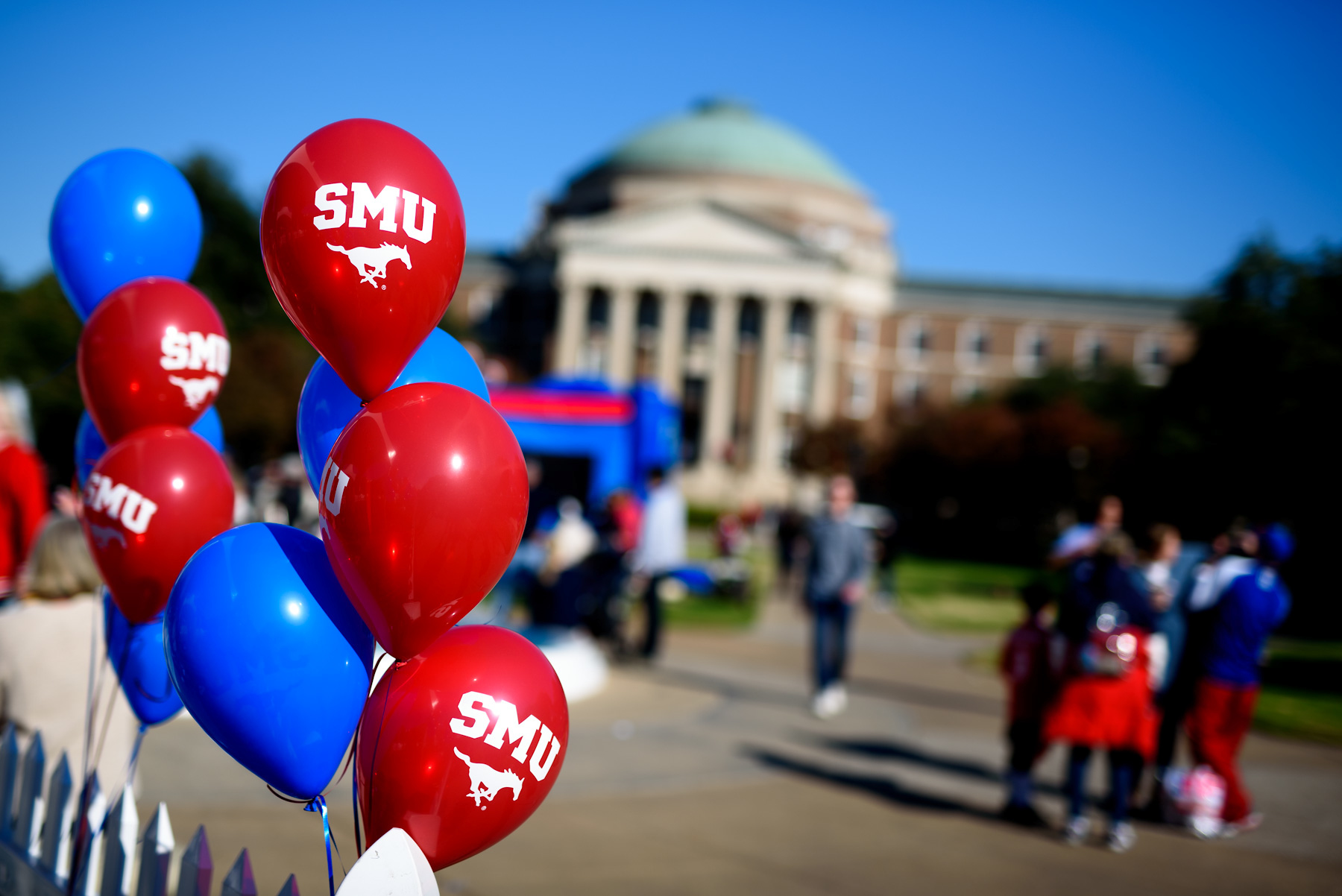The fall semester is arriving fast and North Texas colleges are navigating whether in-person classes during a pandemic is the safest path for students. Paul Quinn College announced Thursday that classes for the upcoming fall semester will be conducted entirely online and tuition will be reduced by $2,325. The University of North Texas, the University of Texas at Dallas, and Southern Methodist University all currently plan to follow a hybrid approach, which provides options for remote and in-person learning at a reduced capacity.
Dr. Michael Sorrell, the president of Paul Quinn College, said the school’s decision prioritizes the health and safety of the Paul Quinn community. He said guidance from medical experts was clear and the difficulty of enforcing social distancing standards in a college environment meant distance learning was the best option until the spread of the coronavirus is under control.
“I think that if other institutions feel as if they have the ability to restrict the behavior of 18 to 22-year-olds, particularly on a 24-hours-a-day 7-days-a-week basis for 15 weeks, and they can do that in a manner which allows them to keep everyone on their campus safe, God bless them,” Sorrell said.
The University of North Texas at Dallas has taken a similar approach, announcing on July 1 that the fall semester would be primarily online with some exceptions for courses like science labs. Most of its students are locals and few live on campus.
But for universities with nearly 40,000 students, like UNT in Denton, another semester online would mean losing multiple streams of revenue, resulting in the loss of millions of dollars each month. Retail shops remain closed, housing gets refunded, and students may choose to transfer. SMU and UTD, with over 11,000 and 29,000 students respectively, face similar potential losses. For all colleges, the question of how to preserve a high quality of education while keeping students and staff safe doesn’t have an easy answer.
According to UNT President Neal Smatresk, UNT loses around $3 million every month of closure from retail sales alone. For universities that rely on football teams for auxiliary support, a fall semester where high-contact sports seem less likely to happen threatens to plunge them deeper into the red.
“People say, well why don’t you just go remote?” Smatresk said. “The answer is A) it would seriously impede, I would say, a majority of our students from being will graduate in a timely fashion and B) it would result in nearly catastrophic financial loss which would result in us having to eliminate a whole bunch … of positions. And part of our responsibility is to try to protect the family and to make sure people have jobs that they can have gainful employment during these very scary and challenging times.”
SMU and UNT resumed limited in-person classes July 6. Both colleges are prioritizing in-person attendance for experiential classes such as labs and music classes. UNT faces a unique dilemma due to its College of Music, one of the largest and most respected in the nation that attracts many out-of-state students.
“If you can’t sing and play an instrument in a choir or in an orchestra, you can’t fulfill the requirements for graduation,” Smatresk said. “We can’t just blindly waive––I mean if you’re in med school you can’t waive classes and internships and so forth that you have to take because you need to be appropriately qualified and certified.”

Offering both online and in-person classes while providing the resources necessary to follow medical guidelines adds additional costs for colleges. Universities are spending more than ever on sanitizing campuses and training faculty and staff to facilitate teaching in this environment. Neither SMU or UNT plan to reduce tuition.
“Of course, we’re in unprecedented times with COVID,” SMU Provost Dr. Elizabeth Loboa said. “This is not the typical environment where they get to go to their classes; they hang out in their [residence] halls together. This is a different environment. So what we want to do is working within the confines of the pandemic and the reality of the situation we’re in and the constantly evolving new data that comes in [to] make sure that we are supporting our students to achieve the very best education possible and also maintaining and ensuring the health and safety of our entire campus community.”
Despite these extra measures, colleges have limited tactics for preventing irresponsible student behavior. In April, 49 students at the University of Texas tested positive for COVID-19 after a trip to Cabo San Lucas that took place despite UT urging caution against student travel and canceling school-sponsored trips. Recently, college students in Alabama were diagnosed with the virus after reportedly organizing “COVID parties.”
“We are certainly concerned about Greek Life, and we’re certainly doing everything in our power to make sure that social activities of the Greeks are compliant with our university policies,” Smatresk said. “It’s very hard to police, as you might guess.”
Smatresk believes the best solution to this problem is hosting student activities with staff supervision. “I genuinely feel they’re safer with organized activities than left to their own devices,” Smatresk said. At SMU, Loboa says a group of students is organizing a pledge to follow COVID-19 guidelines and reaching out to campus leaders including fraternity and sorority councils to gain support.
Then there is the July 7 announcement from the U.S. Immigrations and Customs Enforcement, which threatens to deport international students whose universities went fully online. This further complicates the decision-making process for universities with international students such as SMU, UNT, and UTD. UTD has the largest share of international students in the state with over 5,000, a little less than a quarter of its student body. Since UTD students can choose between online and in-person classes, international students can choose to attend in-person classes–at the risk of their health–to stay in the U.S.
While Paul Quinn doesn’t have much of an international student population, the college’s experience serving as a testing site since June 18 helped inform its decision. “The first thing we’ve learned is the incredible responsibility you have administering tests and just the stress involved in managing life in this new reality,” Sorrell says.”For anyone that is thinking about doing it, the reality is you’re going to need a dedicated staff for managing COVID. And I want to be clear, you’re just managing it. It’s just not about winning. It’s just trying not to lose.”
Since 95 percent of the student population at UNT Dallas is from the area, the spike in local COVID-19 cases helped the college to decide to go online early. “We were more on the fence before the spike… We’re a high-touch university for our first-year students because the majority of them are first-generation college students and so it’s important for us to be very welcoming and provide a lot of support,” says UNT Dallas President Bob Mong. “We’re just going to have to do that virtually right now.”
Mong says a record-high summer enrollment in online classes and a period of financial stability also factored in. Neither UNT Dallas or Paul Quinn have football teams, but transitioning to remote learning coupled with a reduction in fees still puts financial strain on the colleges. Both UNT Dallas and Paul Quinn have provided hot spots and laptops to their students.
“We as an institution have overcome significant challenges in the past,” Sorrell said. “I don’t fear things that I know we can recover from. It doesn’t mean that things might not be difficult. It doesn’t mean they couldn’t be challenging. They absolutely could be. It doesn’t mean there couldn’t be some really difficult things. All that is true, but if I have to make a trade-off between the health and safety of people who have trusted me and a trade-off between having to make some difficult financial decisions, that’s a pretty easy choice.”






